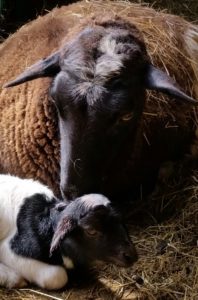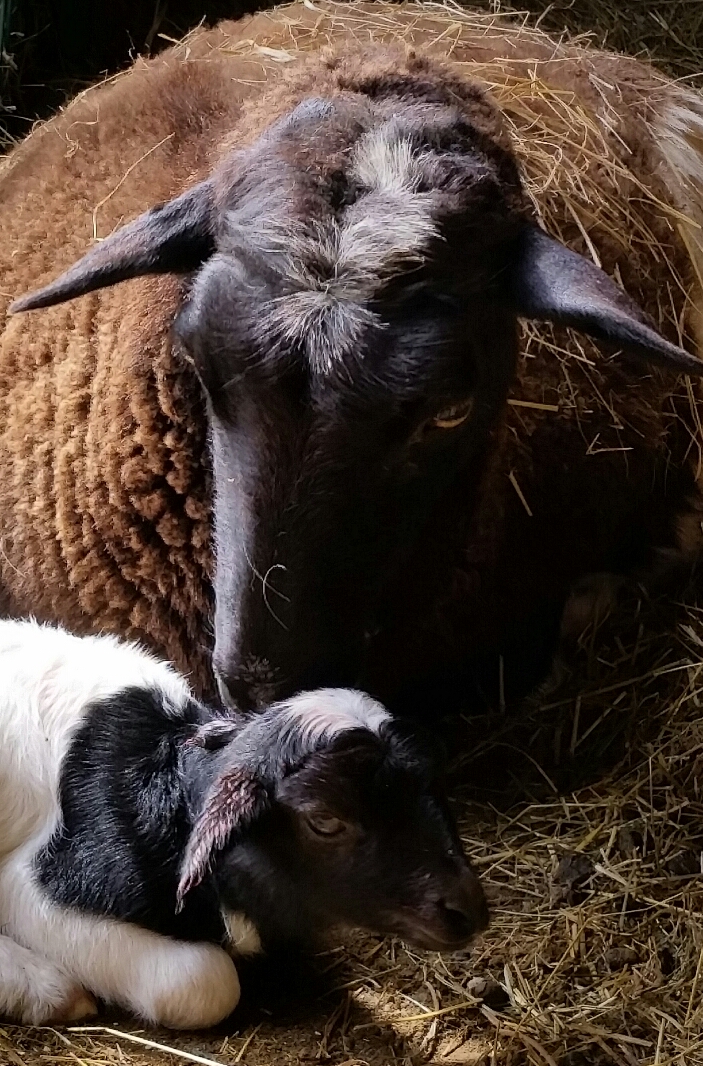You may be aware that I live on 40 acres in a wilderness area, with one man, 2 cats, 3 dogs, 3 ornamental pheasants, 10 pea fowl, 11 goats, 15 sheep, 36 chickens and 50+ guinea fowl. Oh, and 5 hives full of honey bees.
What you may not know is how much these animals teach me about life, love and leadership.
 Take Imelda, for example. One of our ewes, she’s been with us for 4 years. With a diagonally color-blocked coat, she reminds me of a chic woman wearing a sleek designer outfit.
Take Imelda, for example. One of our ewes, she’s been with us for 4 years. With a diagonally color-blocked coat, she reminds me of a chic woman wearing a sleek designer outfit.
I think she’s gorgeous and fell in love with her at first sight.
Alas, my admiration has not been returned… until recently.
In spite of my best efforts, “Mellie” never developed trust in humans. She’s been flighty and aloof which makes any handling, such as hoof-trimming, worming and vaccinations, really challenging.
As for voluntary interaction? Asking for treats or occasional back scratches like some of the other ewes?
Never happened.
And – she’s passed that flightiness on to her offspring, resulting in lambs that have been more difficult to handle than those born to ewes who engage with us.
But something has changed in the past couple of months.
During this year’s spring lambing season I happened to be in the barn when Mellie went into labor. While she was down and pushing in the final stages of birthing, I got involved as it was a really big lamb.
In fact, I was “all up in her business.”
Truly. She allowed me to be up close and really personal as she delivered her baby. For the first time, I was able to offer her aid in completing the delivery.
After he was born, I placed the lamb in front of her, just under her nose so she did not have to get up to begin cleaning him. She accepted the baby and, for once, didn’t flinch from my presence.
This was huge. The beginnings of a massive change.
Mellie even let me help her dry the baby, so that we were both working on him at the same time.
The lamb was not the only thing born that day.
A new trust and willingness to accept me showed up. After years of being distant and easily spooked, Imelda let me in. She even licked my hand as we dried the ram-kin.
Subsequently, she’s begun allowing me to help with her spring shedding (we have hair sheep instead of fleece sheep), leaning in for neck and back scratches. She’s even started nosing around my pockets for treats, becoming really insistent I hand over the goods (usually peanuts).
This is more than reluctant submission or merely tolerating my presence. She approaches me. She initiates contact.
And – this new engaged behavior is not limited to me. She’s approaching my husband, also.
The behavioral change leading to a transformed relationship, while exhilarating to experience, is also incredibly practical.
Consider this: the amount of effort needed to handle Mellie has diminished by at least half. We’re able to vet as needed with far less stress on her and a much faster rebound time from any upset on her part.
It helps that we make it a point to offer treats as soon as any handling occurs so Mellie and the other ruminants are reminded it is safe and rewarding to engage with us.
You can see how this experience with Imelda points to larger lessons in life, love and leadership.
From the beginning, I’ve stood in the possibility of a peaceful relationship with this sheep, even though she did not have the ability to trust – for the first 4 years.
The journey has required faithfulness. Commitment. Unwavering consistency in our behavior.
Cultivating Mellie’s trust? Demanded equal parts of patience and firmness, with generous doses of kindness.
We kept showing up. And showing up. Always mindful that abrupt movements were uncomfortable for Mellie. Always intentional in offering treats and interactions – without forcing those on her.
Part of the process required that we, the humans involved, continued to seek out sources of education so we could learn more effective ways to handle a mistrustful sheep.
We continued to grow ourselves as the leaders in the situation, seeking alternatives that would open a clearer path for a mutually satisfying relationship.
One of the few absolutes in my life? If at all possible, I do not engage with an animal when I am reactive. When my capacity for compassion is depleted.
If I lose patience or get attached to a specific outcome by a specific time (Get in the barn NOW, you silly sheep!), I work to defuse that reaction. This requires me to stretch into patience and compassion on those days when I don’t have as much to give.
Why? Because the more reactive I am, the more difficult the animals will be. They will pick up on my upset and magnify it, making simple routines far more difficult and frustrating.
As the leader in the situation, it is my responsibility to maintain the kind of self-awareness that keeps me from acting out my frustrations on those I lead – and love.
The resulting trust that’s been developed – even with Imelda – makes our daily interactions not just more peaceful and fun, but also more productive. With less effort.
When we have a fence failure? I can stand in the pasture and call the sheep to me most of the time. There’s very little “chasing them down.”
When we need to move the sheep from one managed grazing area to another? Much less difficult with a flock that will eagerly follow the leader into new territory.
Patience. Consistence. Awareness. Commitment to showing up and standing in invitation to a new kind of relationship, a new kind of experience.
Willingness to do the inner work required to embody the desired transformation.
If this field-tested approach for cultivating trust can work with a sheep, imagine what else might be possible.
Imagine…what can happen when invitation to connect is extended and held. Steadfastly. Intentionally. Like a yoga practice for maintaining an open heart.
Imagine… what only becomes possible when cultivation of patience and compassion becomes not something you do just to arrive at a specific outcome but instead, consistent personal practice – for its own sake.
When you stand in invitation – faithfully, consistently, compassionately – to a different kind of connecting, a new experience….imagine the impact this can have on those relationships you want to transform – including (and most importantly) your relationship with yourself.
The next time you hear a person or group of people compared to sheep, implying they aren’t very bright or they are difficult to manage?


Recent Comments